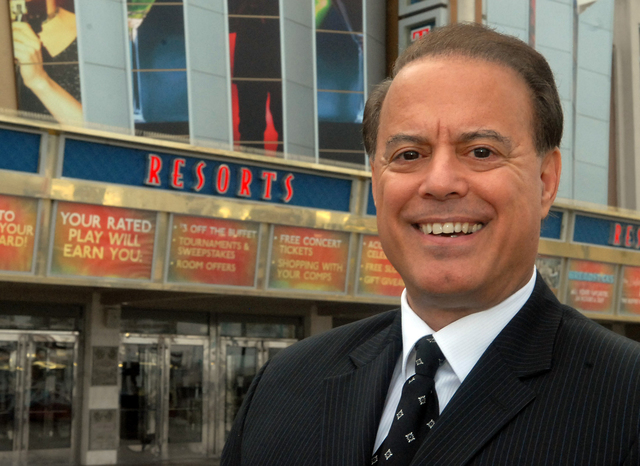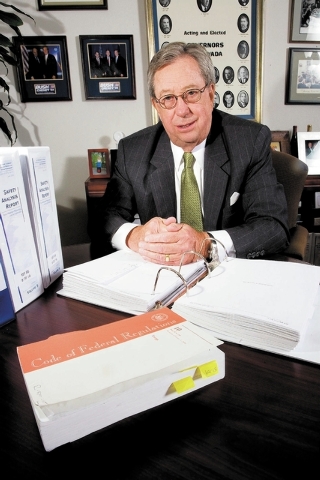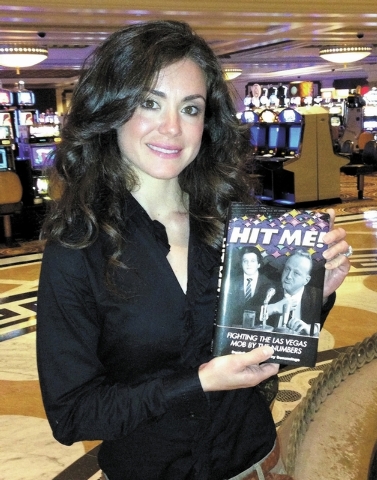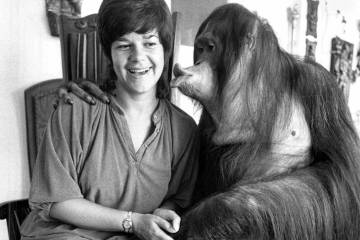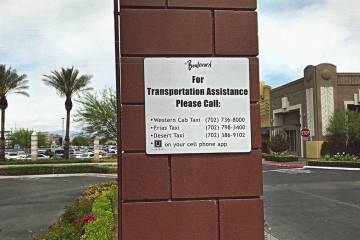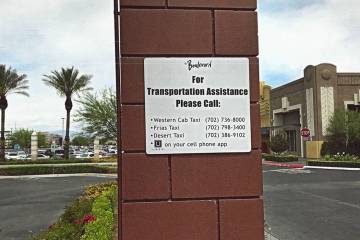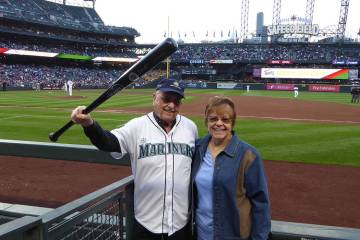Ex-Gov. Robert List responds to allegations in ‘Hit Me!’
I delivered the bad news to former Gov. Robert List. A new book showed him in an unflattering light. He hadn’t read it and was horrified after he did.
“Hit Me!” portrays him as protecting the mob from being investigated, specifically at the Tropicana and the Stardust.
The book is a memoir of Dennis Gomes’ life from 1971 to 1977 when he was chief of audit at the Gaming Control Board, the agency tasked with policing the industry and making sure gaming paid its taxes.
List was attorney general for two terms from 1971 to 1979 and governor from 1979 to 1983.
The ’70s and early ’80s were critical years for Las Vegas, the time the state and the feds were trying to drive out entrenched mobsters who had taken over control of Las Vegas hotels. Hidden ownership and skimming were commonplace.
The Aladdin, the Tropicana, the Dunes, the Stardust, the Fremont, the Hacienda and Slots A Fun were all mob controlled, either overtly or covertly.
Gomes, at 27, was hired as chief of the audit division. The book claims he was hired personally by Gov. Mike O’Callaghan and told to “clean out organized crime in Las Vegas.”
But former Gaming Control Board Chairman Phil Hannifin said the governor had nothing to do with gaming hires and left hiring to Hannifin, who hired Gomes based on a recommendation from Assemblywoman Eileen Brookman.
The second version certainly sounds more believable than the first in the book, co-written by Gomes’ daughter, Danielle Gomes, and novelist Jay Bonansinga.
The book alleges that on two occasions, Gomes asked for a special grand jury, one to investigate the Tropicana and one to investigate the Stardust, and that List squelched both. He also refused to call Joe Agosto forward for a suitability license and take action against the Tropicana, the book claims.
List, Hannifin, former Gaming Commissioner George Swarts and two gaming deputies with the attorney general’s office (Bud Hicks and Mike Sloan) all said those three things List is accused of never happened. They said the gaming regulatory system was set up to be independent of the attorney general, the job List held when the investigations supposedly were squelched by him. (The book claims he squelched one in 1976 when he was governor, but he wasn’t governor then.)
Saturday’s column addressed the specifics of the allegations against List and the rebuttals from the five gaming officials who were there in the 1970s.
List said he never met Gomes or talked to him. “The authors of the book never contacted me,” he said. “I’m not the only one he (Gomes) was critical of. He basically threw Hannifin under the bus, along with the board, the commissioners, his fellow employees.”
List, an attorney, won’t sue for libel. “I guess I’m probably in the eyes of the legal system still a public figure. We’re dealing with a guy who is dead and gone and with a daughter who probably loved her dad very much and probably accepted everything he said.”
Danielle Gomes confirmed that she relied on her dad’s memories. “I know my Dad. In his investigations he wanted them to come down hard. He only saw black and white, and no politics was involved in what my Dad did. He was definitely idealistic and a straight shooter.”
Actually, Hannifin, Swarts, Hicks and Sloan all said Gomes was a straight shooter. I didn’t know him well, but I thought he was, too.
His daughter said Gomes carried a sense of injustice his entire life because of the corruption he saw in Las Vegas and later in New Jersey, where he became a successful owner-operator of resorts.
But the fact is, mob figures at the Tropicana and the Stardust were booted out of Las Vegas in 1979, the first year of List’s governorship. Gaming regulators had been investigating the Trop since the early 1970s under various owners.
It took an FBI wiretap released in 1979 to complete the job with damning evidence of mobsters talking about how to skim and who was skimming.
“We worked with the FBI and took their wiretap information, and we went after the very people he (Gomes) claims were somehow being protected,” List said.
“The book suggests I was somehow tainted, in cahoots with the mob, and in fact, it totally overlooks the fact I’m the guy who took Frank Rosenthal to the Nevada Supreme Court and personally argued the case when he was called forward for licensing,” List said. “I won the case, and it was a landmark case that a gaming license is a privilege, not a right, and constitutional protections are not applicable.
“We took away the licenses of the Tropicana, the Slots of Fun, the Aladdin, the Dunes and Argent. All those individuals he claims were bad guys. Gomes was right about that,” List said. “We not only got them out of there, but we got the new people licensed and in place. For the first time in history, we collected all the taxes. My actions and integrity are the total opposite of what this book suggests. We went from a mob era to a modern era.”
The FBI was prosecuting criminal cases of hidden ownership and skimming while the gaming regulators were ousting hidden owners and skimmers.
At a program at the Mob Museum, List publicly told for the first time what happened in 1979 when U.S. Senate Majority Leader Harry Reid, then the Nevada Gaming Commission chairman, was identified as “Cleanface” in that notorious 1978 FBI wiretap when Joe Agosto boasted, “I gotta Cleanface in my pocket.”
Democrat Reid went to Republican List and offered to resign. List had been pressured by Republicans to demand Reid’s resignation. “He came to me and offered his resignation. I asked if there was any truth to it whatever, and he said no.”
List refused Reid’s resignation. “I won’t take it because it will look to the world like we have corruption in the gaming industry,” List recalled. “I did the right thing, and I was under tremendous heat from Republicans. But it would have sent the wrong message to the world.”
A state investigation later cleared Reid and concluded that Agosto was bragging.
George Swarts, a CPA and gaming commissioner from 1975 through 1980, is thinking of writing his own book about gaming in the ’70s. “A lot of stuff has been written about it, and most of it’s not been correct. The movie ‘Casino’ is a work of fiction, it’s the work of Frank Rosenthal’s demented mind, and it was all a little bit off. That was all baloney; he was just unhappy because we beat him.”
Swarts was referring to the fact that Rosenthal couldn’t get licensed when he was at the Stardust.
“I will tell you there were problems in Gaming Control at that time in terms of how to get the job done and how to get the mobsters out. A lot of it centered around Rosenthal and how to get rid of him. I have been thinking about writing the story about what really happened, the big controversies, the internal strife between a lot of powerful figures, how to deal with Lefty and how to deal with the Chicago mob,” Swarts said.
Bud Hicks, the chief deputy attorney general who worked closely with Gomes, called him “a very dedicated guy and seemed to be on a mission.” But the book overall contains a “lot of exaggeration. He was an angry, frustrated guy. … I don’t think he appreciated the limitations on the state.”
Like Hannifin, Hicks said Gomes and other gaming control agents “gathered some good information that was helpful and helped the Gaming Control Board turn down some licenses. … They were all good honest people, trying to do right.”
But Hicks sensed Gomes believed “everybody was corrupt except Dennis.”
It may be Dennis Gomes’ memoir, but those of us who covered that era knew that while List had various problems, gaming regulators were trying to oust the mob, knowing if they didn’t, the feds would come in.
“Hit Me!” suggests but doesn’t prove that a former governor was corrupt.
No reputable journalist would have made those allegations without further confirmation.
But memoirs are allowed more leeway.
In my memoir, I will be a tall, shapely redhead who won a Pulitzer Prize.
Jane Ann Morrison’s column appears Monday, Thursday and Saturday. Email her at Jane@reviewjournal.com or call her at 702-383-0275.



